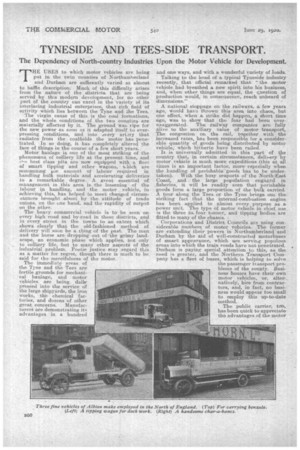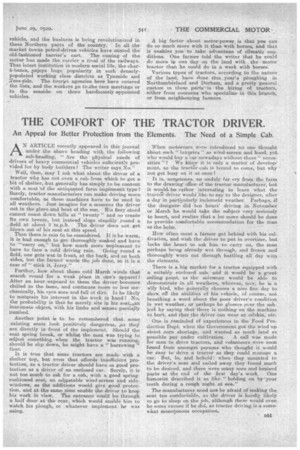TYNESIDE AND TEES-SIDE TRANSPORT.
Page 32

Page 33

If you've noticed an error in this article please click here to report it so we can fix it.
The Dependency of North-country Industries Upon the Motor Vehicle for Development.
THE. USES to which motor vehicles are being put in the twin counties of Northumberland and Durham are sufficently varied as almost to baffle description.. Much of this difficulty arises from the nature of the districts that are being served by this modern development, for no other part cf the country can excel in the variety of its interlacing industrial enterprises, that rich field of activity which lies between the Tyne and the Tees.
The virgin cause of this is the coal formations, and the whole conditions of the two counties are materially affected by it. The ground was ripe for the new power as soon as it adapted itself to everpressing conditions, and into .very artary that radiates from the coalfields the motor has penetrated. In so doing, it has completely altered the face of things in the course of a few short years.
Motor haulage is one of the most striking of the phenomena of colliery life at the preseat time, and
T.',e best class pits are now equipped with a fleet of smart tipping and other wagons, uhich are minimizing tine amount of labour required in handling bulk materials and accelerating deliveries. to a remarkable degree. A great essential of
management in this area is the lessening of the labour in handling, and the motor ;vehicle, in achieving this, has helped to meet changed circum stances brought about by the attitude of trade unions, on the one hand, and the rapidity of output on the other.
The heavy commercial vehicle is to be .seen an every high road and by-road in these districts, and
in every street in the towns to an extent which shows clearly that the old-fashioned method of delivery will soon be a thing of the past. The man and the horse are dropping out of 'the grimy land scape, an economic phase which applies, not only to colliery life, 'but to many other aspect S of the industrial problem. Poetic justice may regard this as a matter for regret, though there is much to be said for the mercifulness of the motor.
The immediatc, areas of the. Tyne and the Tees are fertile grounds for mechani
cal haulage., and motor vehicles are being daikir
pressed into the service of the large shipyards, the iron works, the. chemical fac tories, and dozens of other great concerns. Manufacturer a are demonstrating its advantages in a hundred and one ways, and with a wonderful variety of loads.
Talking to the head of a typical Tyneside industry recently, that official remarked that "the motor vehicle had breathed a new spirit into his business, and, when other things are equal, the question of production would, in consequence, reach unheard of dimensions.
A national stoppage on the railways, a, few years ago, would have thrown this area into chaos, but one effect, when a strike did happen, a. short time ago, was to show that the fear had been overexaggerated. The railway companies are fully alive to the auxiliary value of motor transport, The congestion on the rail, together with the increased rates, has been responsible for a considerable quantity of goods being distributed by motor vehicle, which hitherto have been railed.
It is universally admitted in this part of the country that, in. certain circumstances, delivery by motor vehicle is much more expeditious (this at all times is an important factor, more especially when the handling of perishable -goods has to be undertaken). With the busy seaports of the North-East Coast, and . the large population engaged in fisheries, it will be readily seen that perishable goods form a large proportion of the bulk carried. A tour along the Tees or the Tyne brings out the• striking fact. that the internal-combustion engine has been applied to almost every purpose as a power Unit. The type of motor vehicle in chief use is the three ta, four tonner, and tipping bodies are fitted to many of the chassis. , Corporations and District Councils are using considerable numbers, of motor Vehicles. The. former are extending .their powers in Northumberland and Durham by the aid of well-constructed motorbuses of smart appearance, which are serving populous areas into which the train roads have not penetrated. Durham is paying special attention to this.' as the need is greater, and the Northern Transport Company has a fleet of buses, which is helping to solve the passenger transport problems of the county. Business houses have their awn motor vehicles, or, alternatively, hire from contractors, and, in fact, no business would appear too small to employ this up-to-date method.
The public carrier, tdo, has been quick to appreciate the advantages of the motor vehicle, and the business is being revolutionized in these Northern parts of the country. In all the market towns petrol-driven vehicles have ousted the old-fashioned carrier's cart. The coming of the motor has made the carrier a rival of the railways. That latest institution in modern social life, the charZalaancs, enjoys huge popularity in such denselypopulated working class; districts as Tyneside and Nees-side. The touriat agencies here have entered the lists, and the workers go to-the race meetings or to the seaside on these handsomely-appointed vehicles. A big factor about motor-power, is that you can do so much more with it than with horses, and that it enables you to take advantage of Climatic conditions. One farmer told the writer that he could do more in one day on the land with the motor tractor than he could do in a week with horses.
Various types of tractors, according to the nature of the land, have done this year's ploughing in Northumberland and Durham, and a pretty general custom in these pets-is the hiring of tractors, either from concerns who specialize in this branch, or from neighbouring farmers














































